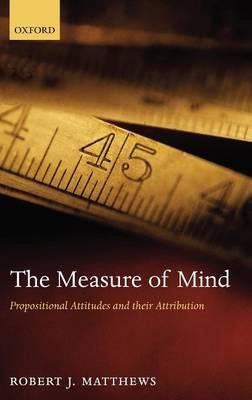
- We will send in 10–14 business days.
- Author: Robert J Matthews
- Publisher: Clarendon Press
- ISBN-10: 0199211256
- ISBN-13: 9780199211258
- Format: 15.6 x 23.4 x 1.8 cm, hardcover
- Language: English
- SAVE -10% with code: EXTRA
Reviews
Description
The Measure of Mind provides a sustained critique of a widely held representationalist view of propositional attitudes and their role in the production of thought and behavior. On this view, having a propositional attitude is a matter of having an explicit representation that plays a particular causal/computational role in the production of thought and behavior. Robert J. Matthews argues that this view does not enjoy the theoretical or the empirical support that proponents claim for it; moreover, the view misconstrues the role of propositional attitude attributions in cognitive scientific theorizing. The Measure of Mind goes on to develop an alternative measurement-theoretic account of propositional attitudes and the sentences by which we attribute them. On this account, the sentences by which we attribute propositional attitudes function semantically like the sentences by which we attribute a quantity of some physical magnitude (e.g., having a mass of 80 kilos). That is, in much the same way that we specify a quantity of some physical magnitude by means of its numerical representative on a measurement scale, we specify propositional attitude of a given type by means of its representative in a linguistically-defined measurement space. Propositional attitudes turn out to be causally efficacious aptitudes for thought and behavior, not semantically evaluable mental particulars of some sort. Matthews' measurement-theoretic account provides a more plausible view of the explanatorily relevant properties of propositional attitudes, the semantics of propositional attitude attributions, andthe role of such attributions in computational cognitive scientific theorizing.
EXTRA 10 % discount with code: EXTRA
The promotion ends in 17d.19:29:04
The discount code is valid when purchasing from 10 €. Discounts do not stack.
- Author: Robert J Matthews
- Publisher: Clarendon Press
- ISBN-10: 0199211256
- ISBN-13: 9780199211258
- Format: 15.6 x 23.4 x 1.8 cm, hardcover
- Language: English English
the role of such attributions in computational cognitive scientific theorizing.


Reviews